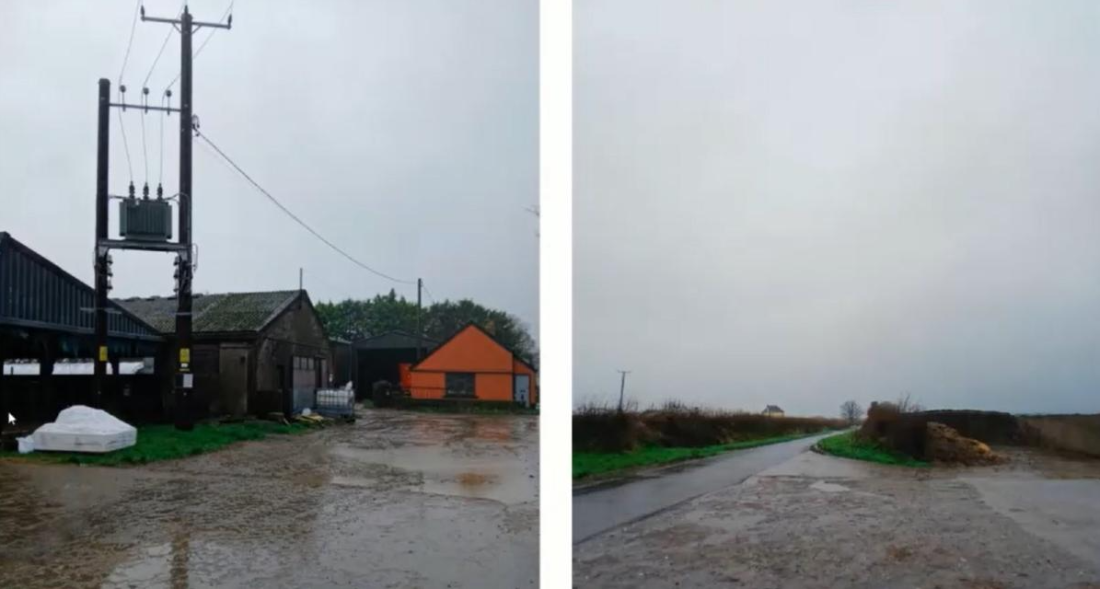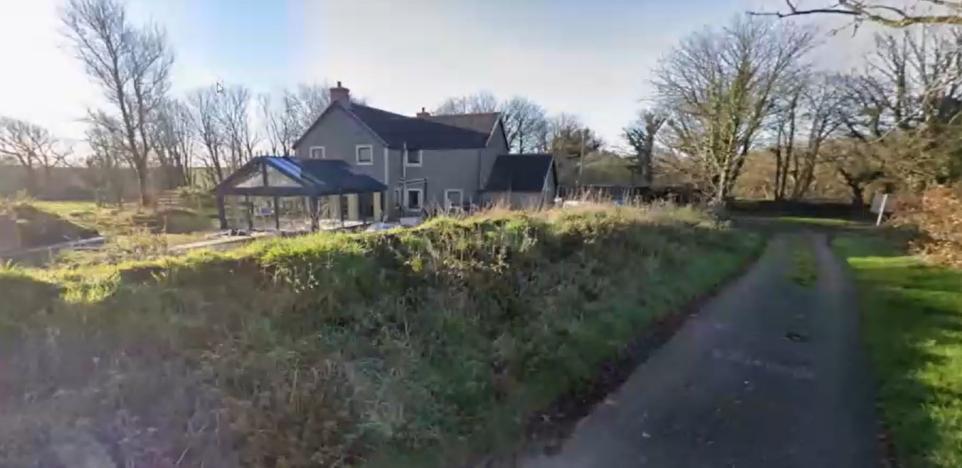Farming
Langdon Mill Farm lodges plans for big new development

One of Pembrokeshire’s largest dairy farms, which has a 2,000-strong dairy herd, has submitted a scheme for new calf buildings to “reduce reliance on third-party farms”.
Hugh James of Langdon Mill Farms Ltd has applied for permission for a calf building and weaned calf building, and associated yard areas, at Langdon Mill Farm, near Jeffreyston, Kilgetty.
A supporting statement, through agent Reading Agricultural Consultants, said: “Langdon Mill Farm is a dairy unit extending to approximately 1,215ha, comprising 283ha owned land and 730ha rented, located approximately 1km north of the village of Jeffreyston.
“A further 162ha is used by the business to spread slurry under informal agreements. The holding currently has a milking herd of approximately 2,000 cows, which are housed indoors for the majority of the year, with dry cows [cows that are not lactating, prior to calving] and heifers grazed outdoors when weather and soil conditions permit.
“There has been significant investment in buildings and infrastructure at the farm over the last decade in respect of cattle accommodation, slurry storage, milking facilities, Anaerobic Digestion (AD) plant and feed storage. The unit is efficient, achieving yields of more than 10,000 litres/cow/year, with cows being milked three times/day in the 60-point rotary parlour.
“Langdon Mill Farm currently directly employs 21 full-time, and three part-time staff (including the applicants). Of these, four live on site in the two dwellings opposite the farm, with the remaining staff living in the locality.”
urrently, calves are reared at Langdon Mill Farm for two months before being transported off-site to be reared at a number of third-party farms in the area.
At 22 months the in-calf heifers are brought back to the maternity building to calve, and then are introduced into the milking herd.
The proposed 61.2m long calf building is required to accommodate young-stock, following separation from the cows, to two-months, with the 164.8m weaned calf building to be used for calves from two months to seven months. Following the construction of the new calf accommodation, the existing building would be used for machinery and straw storage.
Currently, weaned calves are transported by tractor and cattle trailer to be reared at a farm in Cresselly, approximately 2.4km from Langdon Mill Farm.
The application says the proposals would “clearly make the enterprise more financially robust by reducing reliance on third party farms,” adding: “Despite the scale of the new buildings, their relationship to the existing dry cow/maternity building and proposed anaerobic digestion plant would ensure that landscape impact associated with the proposed development would not be significant.”
The application will be considered by planners at a later date.
Farming
Surplus lambs thrive on cold milk feeding, university trial finds

Harper Adams study shows strong growth rates and smooth weaning at 35 days
A TRIAL carried out in 2025 at Harper Adams University has found that surplus lambs can achieve strong daily growth rates when fed milk replacer mixed and delivered cold from eight days of age.
The study, using Lamlac ewe milk replacer, recorded an average weaning weight of 15kg at 35 days of age. Individual lamb weights ranged from 10kg to 19kg, while average daily liveweight gain up to weaning reached 332g per day.
Dr Jessica Cooke, speaking on behalf of Lamlac, said feeding ewe milk replacer cold should be considered a proven and practical technique for producers managing surplus lambs during busy lambing periods.
“Feeding cold milk provides a simple, time-efficient and practical method of rearing surplus lambs on farm, particularly where warm water is not readily available or when lambs of different ages require milk at a consistent temperature,” she said.
“With good attention to detail and suitable environmental conditions, lambs can successfully maintain strong daily growth rates when reared on Lamlac mixed and fed cold from week one. It also reduces labour input compared with preparing and feeding warm milk.”
Colostrum and early management
The trial involved twenty-three Lleyn x Aberblack/Charolais lambs. All were left with the ewe for twenty-four hours to receive colostrum naturally, or were fed colostrum artificially where required.
After the first day, lambs were placed in a training pen and fed warm Lamlac ad-libitum through an Ewe-2 feeder. The milk replacer was mixed at a rate of 200g powder to 800ml of water.
From day eight, lambs were moved to a larger pen where Lamlac was mixed and delivered cold at 10°C using two Ewe-2 feeders.
Fresh creep feed and straw were introduced from day seven to support rumen development and help minimise digestive upset around weaning.
Weaning targets met
Lambs were weaned abruptly at 35 days of age. The target was a minimum bodyweight of 10kg and a daily intake of 250g of solid feed.
Dr Cooke said the findings demonstrate the flexibility available to producers.
“After following recommended rearing practices during the first week of life, feeding lambs cold ad-lib milk offers a straightforward, practical and highly cost-effective method of rearing surplus offspring, particularly where warm water or additional labour are limited.
“However, it is vital that producers use a high-quality milk replacer to ensure good mixing quality and avoid potential problems.”
The trial results suggest cold milk feeding can provide an effective and labour-saving alternative for sheep farmers seeking consistent growth performance in surplus lambs.
Business
Redevelopment plans at Clunderwen dairy farm approved

PLANS for new livestock buildings at a Pembrokeshire dairy farm, aimed at “improved animal husbandry” will not lead to an increase in herd size, councillors heard.
In an application recommended for approval at the February meeting of Pembrokeshire County Council’s planning committee, Mr Roblin of Clynderwen Farm, Clunderwen, sought permission for two livestock building at the 210-hectare dairy farm of 280 cows and 235 head of young stock.
A report for members said each livestock accommodation building would have a length of 77 m, a width of 33m, an eaves height of 3.6m and a ridge height of 8.9m.
Both buildings would be parallel to each other and would cover a footprint of 5,082sqm (2,541sqm each). The proposal includes a total of 308 cubicles, loafing and feed areas, with a central feed passage in the middle.
It said the buildings at the site, some 200 metres from the nearby Redhill school and just over a kilometre from Clunderwen, would sit a little lower than those already on site, and the proposals would not lead to any increase in herd size.
Speaking at the meeting, agent Gethin Beynon said the scheme would lead to “improved animal husbandry to serve the existing milking herd and to support the next farming generation”.
He told members the application was accompanied by environmental enhancements and screening, with no objections from members of the public or any statutory bodies.
Mr Beynon went on to say the herd was currently housed in historic farm site buildings that “fall short of current standards,” with a farm move towards Holstein cattle which need more space.
Read More:
- Police investigating report of livestock worrying after 11 sheep found dead
- Four arrested in major armed police operation in Pembrokeshire town
- Climber died and two others injured in incident on Pembrokeshire coast
“It will improve animal husbandry and efficiencies in what is currently a challenging market,” he concluded.
Approval was moved by Cllr Alan Dennison, seconded by Cllr Brian Hall, and unanimously backed by committee members.
Farming
Housing restriction at Hayscastle farm site removed

A CALL to remove an agriculture condition imposed back in 1989 on a Pembrokeshire farm site which is said to be “economically unviable” as a farm has been given the go-ahead.
In an application recommended for approval at the February meeting of Pembrokeshire County Council’s planning committee, Rosalyn Jayne Evans sought permission for the removal of an agricultural worker-only condition for residence at Upper Hayscastle Farm, Hayscastle, near Haverfordwest.
The original condition was imposed as part of a 1989-approved planning application.
A report for members said the land, some 26.3 hectares,” is, following independent valuation, not considered to be an ‘economically viable unit in its own right’.”
“The report author contends this was also likely to have been the case at the time when [the 1988 scheme] was originally granted as no housing for livestock, crop or slurry storage was provided as part of the original consent or since the approval.
“The report also states that whilst the land is productive for uses such as grazing and crops, the lack of building(s) would restrict the economic viability of Dolfach as a separate agricultural holding.
“If investment were to now be made at the holding in relation to dairy or beef farming, the report contends that this would be economically unviable, due to the holding at Dolfach being unable to support a sufficient number of animals to produce the financial return required to sustain the business. The report also highlights that building(s) for livestock would be essential in relation to the prevalence of Bovine TB in the locality.”
It added: “It is considered that the information provided by JJ Morris is sufficient to indicate that the scale of the land holding and the lack of infrastructure would make a farming enterprise at the site an economically unviable proposition.”
It recommended “the existing Section 52 agreement be discharged to remove the requirement for the dwelling to be tied to the land in agriculture at Upper Hayscastle Farm and for the dwelling to be occupied by a person solely or mainly employed before retirement in agriculture”.
The recommendation of approval was moved by Cllr Brian Hall and unanimously backed by committee members.
-

 Health3 days ago
Health3 days agoHealth Board to decide future of nine key services at two-day meeting
-

 Business5 days ago
Business5 days agoComputer Solutions Wales under fire from customers
-

 Business7 days ago
Business7 days agoMinimum alcohol price to rise by 30 per cent as retailers warn of border impact
-

 Charity5 days ago
Charity5 days agoWelsh patient voices help shape new UK-wide online kidney forum
-

 Community4 days ago
Community4 days agoFacebook ‘news’ site targeting Herald editor collapses after community backlash
-

 Crime7 days ago
Crime7 days agoPembroke Dock man admits threatening to hack woman’s head off with sword
-

 Community5 days ago
Community5 days agoCalls for traffic calming in Neyland after car hits house
-

 Health7 days ago
Health7 days agoNHS Wales app gives tutor fresh start after mental health struggles


























